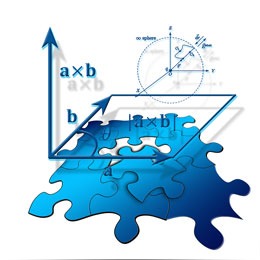How does math affect our everyday lives?
Mathematics has a HUGE impact on the world around us. Without math and mathematicians, there would be no cars, televisions, advanced drugs, and so much more. Some would say that today’s world is built on the foundations of mathematics. Math isn’t simple – mention it to a student taking algebra or calculus and you will likely get rolled eyes, moans, and sounds of frustration. Talk to a physicist, banker, or chemist and you will have a much more positive response – it is fundamental to what they do every day.
In our technology-driven world, a lot of times math is hidden from us. For example, the process of buying anything in a store primarily involves the use of a credit or debit card. You pay the exact amount instead of handing over a $20 and making sure you get the right change. Even in math class its self, the use of calculators is now assumed at higher level grades because calculators are literally all around us and usually right by us in our smart device. Computers are great at math and have automated many of the tasks that require mathematical computations.
A brief history of math
Covering the full history of math is a daunting task as much as the subject itself, it seems. But one thing is for sure about humans is that they have the brains to organize the things around them. For this reason, they keep on counting everything they have on hand. Mathematics is as old as civilization itself, with the ancient Egyptians, Chinese, Greeks, the Mayans, and the Babylonians developing their impressive works using their mathematical knowledge, as shown in their early documents and artifacts.
However, as the centuries passed, the development of math continued to evolve. Noted mathematicians from the ancient times up to the 20th century have contributed their discoveries and innovations to mankind’s knowledge of this field. Their theories and applications are still being taught in schools and universities today. Innovations of today are due, at least in part, to those early mathematicians who spoke the language of numbers.
Famed mathematicians include Archimedes, Euclid, and Pythagoras from the ancient times. Newton and Descartes are only a few of the very noted mathematicians from the 16th to 18th century, although there were also many others like Euler, Langrage and Laplace who were responsible for the equations that helped in the estimation of electricity and hydrodynamics. Johann Karl Friedrich Gauss was considered the greatest mathematician of his time. Despite his poor background and illiterate parents who didn’t give importance to education, Gauss defeated the odds and went on to obtain his doctorate degree. He contributed significantly in many mathematical fields like algebra, numbers theory, geometry, electrostatics, and many more.
In the 20th century, the most famous mathematicians were John von Neumann, Bertrand Russell, and Albert Einstein. Einstein’s theory of relativity (E=mc2) lent a big impact on our everyday lives. Without it, we wouldn’t have GPS, among other things, but his theory also pointed to nuclear energy which led to atomic bombs, which Einstein himself — a man of peace — later came to regret. The theory of relativity remains a cornerstone of modern physics.
History of math timeline
The history of innovation in science closely follows the advance of math. There are the same large gaps in advance followed by a speeded-up timeline
- 50,000 B.C – Crude counting
- 25,000 B.C – Early geometrical designs
- 450 B.C. – Greek numeral system and the concept of infinity
Followed much later by:
- 800 A.D – Islamic mathematicians expression of symmetry
- 1684 A.D. – Leibniz’ initial treatise on calculus
- 832 A.D. – Babbage’s Analytical Engine (e.g., first concept of a computer)
- 1905 A.D. – Einsteins’ special relativity
- 1916 A.D. – Einstein’s general theory of relativity
- The 1900s – The development of automated machines for calculating math including mechanical calculators and computers
Math has a vital impact on scientific fields
And today the advance of math continues on in fields such as physics, astrophysics, chemistry, medicine, and more. If you are a parent struggling with the intro to algebra, those big ideas seem quite remote and not worth much attention. Your own limitations toward math need not keep your child who is interested in numbers from moving forward. Fortunately, there are many ways to get your children excited about math and learn to value learning math. That can include the “big dream” ideas of outer space, advanced technology, or fun computer games that make math enjoyable.
In short – math is a foundational concept and tool which is important to be aware of for all walks of life. If it weren’t for the advancements in math, so much of the technology of today would not be available to us.
Useful related links for further reading
- The Use of Mathematics in Everyday Life | Everyday Life – Global Post
Even those suffering from math-related anxieties or phobias cannot escape its everyday presence in their lives. From home to school to work and places in-between, math is everywhere. Whether using … - Math in Daily Life
Math in Daily Life: How much will you have saved when you retire? Is it better to lease or buy a car? Learn the answers to these and other mathematical questions that affect our daily decisions. - History of Mathematics – Main Page
- History of mathematics – Wikipedia, the free encyclopedia
